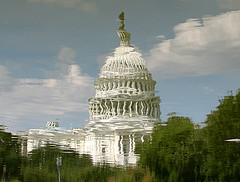
A lot of scuttle has been made lately about Utah gaining a fourth seat in the US House of Representatives. This would be a great boon to Utah, but only if it is done the correct way.
Updated December 28, 2006.
Utah governor John Huntsman Jr. has been very interested in drawing up plans for a fourth district for the United States House of Representatives. He has been so aggressive that it has caught some Utah legislators by surprise.
A plan actually already exists. In 2001, following the 2000 US census wherein Utah narrowly missed getting that 4th seat, and in anticipation of winning a subsequent appeal at the Supreme Court (Utah missionaries living out of country were not counted in the census) that plan was drawn up. Utah Senate President John Valentine says the 2001 plan "is the official four-seat plan."
It is interesting to note why there is currently a new push for a 4th Utah seat in the House, considering that the 2010 census is about 4 years away. In conjunction with giving Utah a 4th seat, the District of Columbia would get its first-ever seat. Currently the District's non-voting representative can vote in committee only.
Recently I posted on this site about what does and does not constitute Constitutional. Well, in light of my opinion, let's turn directly to the Constitution. Article I, Section 2 of that document begins by saying:
The House of Representatives shall be composed of Members chosen every second Year by the People of the several States, and the Electors in each State shall have the Qualifications requisite for Electors of the most numerous Branch of the State Legislature.
This paragraph leaves a little bit to speculation as to whether a Representative in the United States House must be elected from a particular state. Combined with the next paragraph, however, any confusion on the issue is put to rest.
No Person shall be a Representative who shall not have attained to the Age of twenty five Years, and been seven Years a Citizen of the United States, and who shall not, when elected, be an Inhabitant of that State in which he shall be chosen.
Not only is it a requirement that the person elected to the House of Representatives be an Inhabitant of the state for which he is being elected; it is also a requirement that the electors of that state participate in the election. The District of Columbia is not a state.
But we wouldn't want an insignificant little detail such as that to get in Utah's way of getting its 4th seat, would we? Actually, yes we would.
Some Constitutional issues are vague as to their interpretation. This one is not. If Utah waits until the 2010 census, we will very likely get our 4th seat in a fair and credible way. If we show our impatience now, Utah will live with the ignominy of being the first state to participate in the violation of paragraphs 1 and 2 of Article I, Section 2 of the Constitution.
Update: December 28, 2006 - Former Utah Congressman James Hansen agreed in a Deseret News opinion with much of the information in this post, and warned that a House seat would not be the only thing demanded by DC--they would logically want 2 Senate seats as well. And then Guam, Puerto Rico, and American Samoa would clamber for representation as well. It's too bad he retired instead of a couple of our sitting Senators.
I'd sure like to have more Utah voices in Washington and D.C. representation would be good for the country.
ReplyDeleteBut you are right. It can't be done short of D.C. statehood or changing the Constitution. Or, of course, ignoring the Constitution; Congress doesn't have any problem doing that.
Read my weblog.